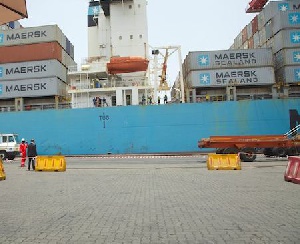Ghana’s strict adherence to a 60-tonne limit for transit cargo is pushing haulage companies into neighbouring countries like Benin, Togo and Côte d’Ivoire, where they can load up to 68 tonnes.
The Shipping Review, a quarterly journal of the Ghana Shippers’ Authority (GSA), has reported of a significant reduction in transit traffic through the country’s seaports as a result of the new axle load policy.
Axle load is the acceptable weight of cargo that a truck is allowed to carry, and it is intended to, among other things, prolong the lifespan of roads.
A report in the journal, titled “The Axle Load Regime in Ghana: Implementation Challenges and its Impact on Transit Trade," said a number of Ghanaian haulage trucks have moved to neighbouring Benin, Togo, Nigeria and Côte d’Ivoire to take advantage of the higher limits in those countries.
The situation has arisen out of the lack of a uniform load limit for truckers in the ECOWAS sub-region.
Being able to load more means fewer trips for the same cargo, which is the business sense driving Ghanaian truckers to other destinations.
The report therefore called on government through the Ministry of Roads and Highways and the Ministry of Transport to review the limit to be at par with neighbouring countries as a short-term measure to provide a fair and competitive platform to the country’s transporters and shippers.
Statistics from the Ghana Ports and Harbours Authority (GPHA) show that transit cargo through Tema and Takoradi declined from 1.07 million tonnes in 2008 to 523,609 tonnes in 2009, the year the axle load policy was introduced. There was a further decline to 448,229 tonnes in 2010.
In 2013, total transit cargo stood at 661,391 tonnes, an increase which, according to the report, is a reflection of the increase in Burkina Faso trade volumes through Ghana.
The Ghana Highway Authority (GHA) introduced the 60-tonne axle load regime, but it has been faced with criticism from the various affected players – notably the Ghana Haulage Transporters Association (GHATOA) and the Ghana Institute of Freight Forwarders.
A one-day stakeholders’ dialogue organised by the Ghana Shippers’ Authority (GSA) and the Borderless Alliance, a private-sector trade-facilitation organisation, in May this year to deliberate on the issue ended without consensus.
At the forum, the truckers asked the GHA to increase the maximum load limit to 68 tonnes to enable them to compete effectively and avoid the situation where they would lose business to their West African counterparts.
But the plea from local transport owners seemed far from being accepted when the Deputy Transport Minister, Joyce Mogtari Bawa, opined that the new policy will help to reduce accidents and breakdown of trucks as well as prolong the lifespan of the country’s roads.
Chief Executive Officer of the Ghana Shippers’ Authority, Dr. Kofi Mbiah, confirmed the situation in an interview with the B&FT and called for a harmonised axle load limit for the sub-region to enhance free movement of goods and services.
He said the situation whereby the load limit does not favour one side of the competition does not provide for a level playing field.
“We need to debate this axle load issue. We are concerned about the deterioration of our roads, but we need to balance it against trade efficiency. As a region, we trade among ourselves; so if we have countries that have a higher axle load limit, there will definitely be a problem in the movement of cargo.
“The need for harmonisation therefore becomes critical; we need a high-level committee at regional level to look at the practical issues on the ground.”
Click to view details



Business News of Monday, 1 September 2014
Source: BFT

















